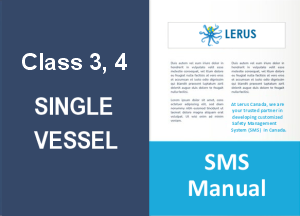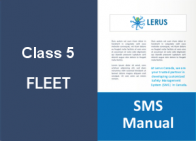
Customized SMS Manual - Class 3, 4 Single Vessel
Availability: In stock
SMS Package Includes:
Initial Assessment
Conduct a detailed analysis of your current safety management practices to identify any gaps in compliance with the latest Canadian and international regulations.
SMS Manual Development (Electronic version, PDF)
Develop an SMS manual specifically tailored to the type(s) of vessels in your fleet, addressing unique operational and regulatory requirements.
Ensure that the manual meets all local and international safety management standards applicable to your operations.
Design the manual to be easily understandable and actionable.
Forms, Logs, and Checklists
Supply a complete package of all required forms, logs, and checklists that are essential for recording and monitoring safety management activities.
Tailor these documents to the specific needs of your vessels and operations to enhance usability and relevance.
Provide digital copies for ease of use.
Online Assistance
Offer ongoing support via email to address any questions or issues related to the implementation of the SMS.
Access our team of SMS experts who can provide advice, clarify doubts, and suggest best practices for effective safety management.
Commit to timely and informative responses to ensure your queries are resolved promptly, helping you maintain continuous compliance and operational efficiency.
Lerus AI Assistant
Above you will find a link to our AI Chatbot. It answers questions about the Marine Safety Management System from Lerus Canada. See the original webpage: Lerus AI Assistant.
Why it is required?
Canada is embarking on a significant shift in maritime safety regulations, impacting a vast array of vessels operating in Canadian waters. These changes are driven by a commitment to align with international safety standards and enhance the safety culture within the maritime sector. Currently, only Canadian SOLAS vessels are required to have a Safety Management System (SMS). The Transportation Safety Board (TSB) has made recommendations urging Transport Canada (TC) to implement regulations that mandate all commercial operators in the marine industry to establish formal safety management processes (recommendations M04-01 and M17-02).
The new regulations aim to extend formal SMS requirements beyond SOLAS vessels, covering the majority of Canadian vessels and foreign vessels in Canadian waters. The Canadian fleet will be categorized into five classes, each with specific SMS and oversight requirements based on vessel size and type of operation. The responsibility for developing and maintaining an SMS will lie with the vessel’s Ship Manager or the Authorized Representative (AR).
Vessels in Classes 1 to 3 will adhere to the International Safety Management (ISM) Code requirements, while Classes 4 and 5 will follow Canadian requirements influenced by the ISM Code. There will be transitional periods for Class 2 to 5 vessels for up to 3 years to comply with the new requirements, with variations based on class and operation type.
The goal is to ensure a larger portion of Canada’s fleet adheres to a higher safety standard to align Canada’s safety management practices with international standards. Compliance will be enforced through risk-based inspections conducted by marine safety inspectors, with the frequency of inspections and related activities determined by the Minister of Transport.
Foreign vessels operating in Canadian waters will also be required to have a documented SMS, with certain exceptions for government-operated non-commercial vessels.
It is crucial for shipowners and operators to understand and prepare for these regulatory changes. The Canadian government’s commitment to maritime safety is unwavering, and these new regulations are a significant step towards a safer and more responsible maritime environment in Canada.
The proposed Marine Safety Management System Regulations will expand Safety Management System (SMS) requirements to a larger portion of the Canadian fleet, including non-SOLAS vessels. All related vessels will be required to have a Canadian Document of Compliance (DOC, Interim DOC & CDOC) which covers both shore-based and onboard operations. Additionally, all vessels will need to obtain a Safety Management Certificate (SMC, Interim SMC & CSMC) which specifically covers the onboard operations of each individual vessel in the fleet.
To obtain a Document of Compliance and Safety Management certificates, shipowners and vessels must demonstrate adherence to the International Safety Management (ISM) Code and the new regulatory requirements.
For more detailed information and updates on these upcoming changes, we encourage you to visit the dedicated section on the Transport Canada website.
VESSEL CLASSES:
Class 1:
-SOLAS vessels, including those with 500 or more gross tonnage
(GT) that are engaged on an international voyage
Class 2:
- vessels of 500 GT or more, not covered under Class 1; and
- passenger vessels of 24 metres in length or more carrying 50 or more passengers
Class 3:
- vessels of 24 metres or more, not covered under Classes 1 and 2
Class 4A:
- vessels of more than 15 GT, not covered in Classes 1 to 3
Class 4B:
- passenger vessels and tugs up to 15 GT, not covered in Classes 1 to 3
Class 5:
- Other vessels of up to 15 GT, not covered in Classes 1 to 4
The following vessel types are not subject to the Regulations:
- Vessels subject to the Fishing Vessel Safety Regulations;
- Non-propelled vessels that do not carry persons, dangerous chemicals in bulk, or oil in bulk;
- Human-powered vessels;
- Vessels used for whitewater rafting; and
- Pleasure craft.


